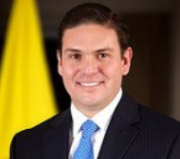

9:00 am EDT - 10:30 am EDT
Past Event
9:00 am - 10:30 am EDT
1775 Massachusetts Avenue N.W.
Washington, DC
20036
One of the United States’ closest allies in Latin America, Colombia is a critical player in the hemisphere. In a historic breakthrough after decades of intense civil war, the government of Colombia signed a peace deal with the leftist insurgency group, the Revolutionary Armed Forces of Colombia (FARC). Yet Colombian citizens have mixed views of how successful the peace deal has been, and many aspects of the peace accord implementation have been challenging. How Colombia’s President-Elect Ivan Duque approaches the deal and its implementation creates further questions, as he has stated that the peace accord needs corrections. Other challenges facing Colombia include persistent violence among other insurgent and criminal groups, increasing drug production and trafficking, a weakened economy, and instability in and refugee flows from neighboring Venezuela.
On July 25, Foreign Policy at Brookings hosted an event exploring these dynamics and U.S.-Colombian relations. Juan Carlos Pinzón, former Colombian minister of defense and ambassador to the United States, offered opening remarks. He was joined by Brookings Senior Fellows Michael O’Hanlon and Vanda Felbab-Brown.
Following their conversation, panelists took audience questions.
Moderator

Panelist



Joshua Rovner
March 4, 2026

Suzanne Maloney, Itamar Rabinovich, Mara Karlin, Vanda Felbab-Brown, Stephanie T. Williams, Sharan Grewal, Steven Heydemann, Dafna H. Rand, Aslı Aydıntaşbaş, Kemal Kirişci, Hady Amr, Constanze Stelzenmüller, Pavel K. Baev, Steven Pifer, Ryan Hass, Tanvi Madan, Lynn Kuok, Michael E. O’Hanlon, Caitlin Talmadge, Joshua Rovner, Samantha Gross, William A. Galston, Scott R. Anderson +18 more
March 3, 2026

Jeffrey Feltman
March 2, 2026